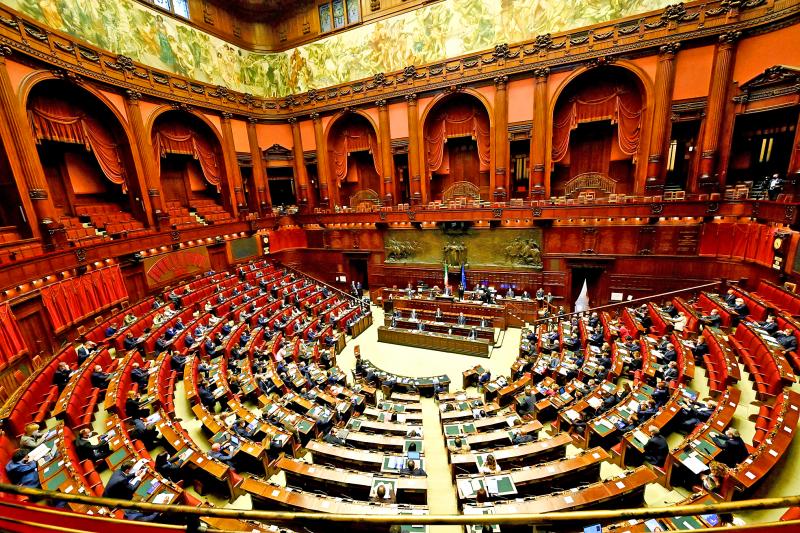Italian parliamentarians yesterday began casting their votes for a new president after the scandal-plagued former Italian prime minister Silvio Berlusconi abandoned his dream of becoming the next head of state.
More than 1,000 lawmakers and regional delegates would participate in the complex secret ballot, described as being akin to the appointment of a new pope, that could go through several rounds before a successor to Italian President Sergio Mattarella, who is due to step down on Thursday next week, is elected.
The winner of the seven-year mandate requires a two-thirds majority within the first three rounds of voting; from the fourth, an absolute majority is sufficient. Only on three occasions in the history of the election has a new president emerged in the first round.

Photo: Reuters
Berlusconi, who served Italy four times as prime minister, failed to garner enough support for his bid and in a heartfelt letter wrote that in the spirit of “national responsibility” he asked his backers to “give up” identifying him as a contender.
On Sunday, he checked into hospital for “routine” checks, his spokesman said, although two sources told Reuters that he had been in hospital since Thursday and there were reports in the Italian media that his family had been worried about his health.
Even though there are no official candidates in Italy’s presidential election, the 85-year-old broke from tradition and campaigned by calling up unaffiliated parliamentarians to tap them for votes, while augmenting his public persona by publishing full-page adverts in national newspapers highlighting personality traits and accomplishments that he said made him the best person for the job.
His renouncement removed an obstacle to negotiations on a mutually agreeable candidate between the political party leaders.
Italian Prime Minister Mario Draghi, who has been credited with restoring stability in Italian politics, is seen as the frontrunner, even if broad support is not guaranteed over fears his move to the presidential palace could trigger early elections.
The most crucial issue at stake is the Italian government’s adherence to the reforms that need to be enacted to secure installments from the EU’s post-COVID-19 pandemic recovery fund, of which Italy is the biggest beneficiary.
Italy’s president is a largely ceremonial role, albeit with the power to resolve political crises, pick prime ministers, call early elections and approve or scrap laws.
Draghi, 74, has neither confirmed nor denied his interest in becoming president. Other possible contenders for the presidency include Pier Ferdinando Casini, a centrist senator who reportedly has good cross-party relations, Marta Cartabia, the justice minister, and Giuliano Amato, a former prime minister.
Neither the left nor the right hold enough power in parliament to call the shots, so the deadlock will need to be broken. Parliamentarians would vote once a day until a winner emerges.

A new online voting system aimed at boosting turnout among the Philippines’ millions of overseas workers ahead of Monday’s mid-term elections has been marked by confusion and fears of disenfranchisement. Thousands of overseas Filipino workers have already cast their ballots in the race dominated by a bitter feud between President Ferdinand Marcos Jr and his impeached vice president, Sara Duterte. While official turnout figures are not yet publicly available, data from the Philippine Commission on Elections (COMELEC) showed that at least 134,000 of the 1.22 million registered overseas voters have signed up for the new online system, which opened on April 13. However,

ALLIES: Calling Putin his ‘old friend,’ Xi said Beijing stood alongside Russia ‘in the face of the international counter-current of unilateralism and hegemonic bullying’ Chinese President Xi Jinping (習近平) yesterday was in Moscow for a state visit ahead of the Kremlin’s grand Victory Day celebrations, as Ukraine accused Russia’s army of launching air strikes just hours into a supposed truce. More than 20 foreign leaders were in Russia to attend a vast military parade today marking 80 years since the defeat of Nazi Germany in World War II, taking place three years into Russia’s offensive in Ukraine. Putin ordered troops into Ukraine in February 2022 and has marshaled the memory of Soviet victory against Nazi Germany to justify his campaign and rally society behind the offensive,

ENTERTAINMENT: Rio officials have a history of organizing massive concerts on Copacabana Beach, with Madonna’s show drawing about 1.6 million fans last year Lady Gaga on Saturday night gave a free concert in front of 2 million fans who poured onto Copacabana Beach in Rio de Janeiro for the biggest show of her career. “Tonight, we’re making history... Thank you for making history with me,” Lady Gaga told a screaming crowd. The Mother Monster, as she is known, started the show at about 10:10pm local time with her 2011 song Bloody Mary. Cries of joy rose from the tightly packed fans who sang and danced shoulder-to-shoulder on the vast stretch of sand. Concert organizers said 2.1 million people attended the show. Lady Gaga

CONFLICTING REPORTS: Beijing said it was ‘not familiar with the matter’ when asked if Chinese jets were used in the conflict, after Pakistan’s foreign minister said they were The Pakistan Army yesterday said it shot down 25 Indian drones, a day after the worst violence between the nuclear-armed rivals in two decades. Pakistani Prime Minister Shehbaz Sharif vowed to retaliate after India launched deadly missile strikes on Wednesday morning, escalating days of gunfire along their border. At least 45 deaths were reported from both sides following Wednesday’s violence, including children. Pakistan’s military said in a statement yesterday that it had “so far shot down 25 Israeli-made Harop drones” at multiple location across the country. “Last night, India showed another act of aggression by sending drones to multiple locations,” Pakistan military spokesman Ahmed